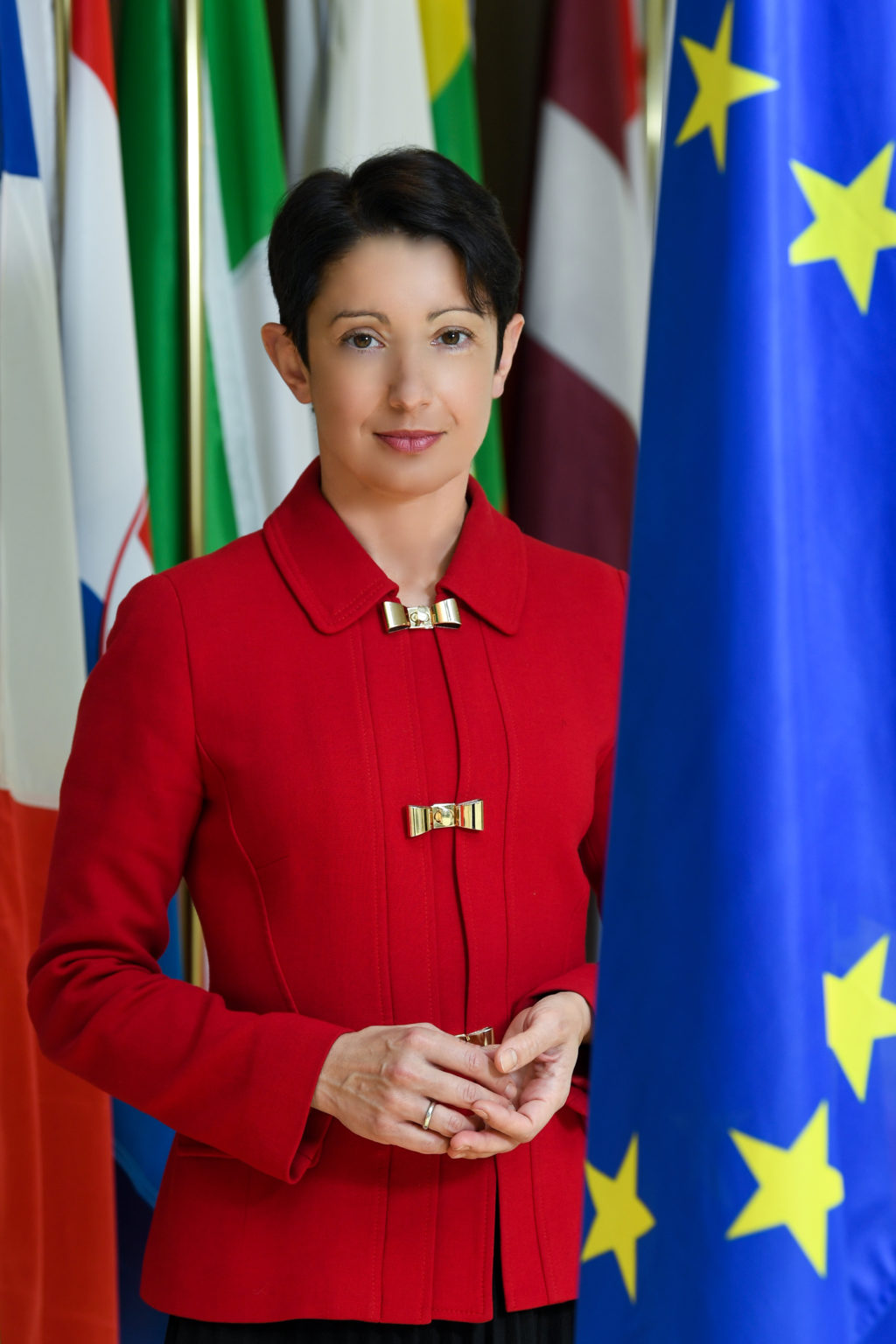The consequences of the outbreak of the Covid-19 for the European society – Interview of Dr. Milena Angelova, Vice President at European Economic and Social Committee

Brussels: 26/03/2018 EESC- Photo session – future Vice-president for Budget Ms Angelova credit: Sierakowski / Isopix
Interview publiée le 22 Juin 2020
Centre Algérien de Diplomatie Economique : Dear Dr. Milena Angelova, can you introduce your self to our readers ?
Milena Angelova :I have been serving as Secretary-General of the Bulgarian Industrial Capital Association since 2002. I am a member of the European Economic and Social Committee since 2007, currently VP on Budget, elected in 2018 and I before that I was an EESC Employers’ Group Vice-President from 2010 to 2018. Member of the Budget Group since 2013. I was elected CEEP Executive Vice-President in 2011, re-elected in 2014.
Also I am a member of the Bulgarian Economic and Social Committee since 2006 and I have always had an active position in the decision – making processes in Bulgaria in all matters concerning business climate improvement because of my expertise in the field of corporate governance, corporate social responsibility, better legislation, SMEs and entrepreneurship promotion and European funds management. I have a PhD in international marketing and was lecturing for a while.
As a member of the Employers’ Group of the EESC, I have worked since 2007 as rapporteur, co-rapporteur and member of different bodies to defend the interests of business community regarding important topics such as corporate governance, capital market union, services of general interests’ promotion, red tape cutting, business climate improvement, combating grey economy, etc.
CADE : The COVID19 pandemic affects all countries of the European Union to varying degrees and consequences are at all levels. With regard to European health systems, what are the main impacts detected ?
Milena Angelova : The COVID-19 pandemics had a huge impact on all EU countries, but indeed at different degrees. It has shown a substantial difference in the Member States’ capacity of their health systems and a lack of a common approach at EU level.
Under-resourced health systems have been unable to cope effectively with the pandemics, while well – resourced health systems have been far more effective in assisting the huge amount of patients caused by the virus outbreak. The availability of beds in intensive care units, equipment and medical appliances, in particular, has been critical. The importance of investments in health to successfully face similar situations has clearly emerged. Equally important proved to be maintaining and updating stock of sanitation, hygiene and protective materials and tools, as their shortage was one of the main challenges.
COVID-19 hit very strong on the health workforce. Some countries have suffered from a scarcity of doctors and nurses and, as a consequence, have been forced to ask retired staff to come back to work, to employ students still finishing their degree or to receive health workers from other EU countries. Primary care was also affected, with GPs being exposed to the virus without having received any clear guideline, information and protection and this, in some EU Countries, until some weeks after the pandemics was ravaging.
The pandemics has shown once again that no health system alone can face a virus that recognizes no borders in an interconnected world and win against it. In the early phases, the lack of coordination and of common action by the EU was painfully visible. This was mainly due to the limitation of EU power in the field of health, which remains a national competence and where the EU has only a role of coordination.
Despite this, the EU has quickly reacted to the emergency with instruments providing short -term responses and granting a fair access to medicines, equipment, devices and expertise to all EU Countries.
In many countries, the somewhat neglected health sector and health workers have shown their undisputable value, despite the conditions in which they were working and their limited resources. Now we have the duty to support them, by developing their infrastructures and improving their working conditions through appropriate financial contributions.
And indeed, looking at the medium and long term, the EU has just launched, last 28th May, a proposal for a new Health programme: EU4Health. With an envelope of €9.4 billion, this programme will have the following three general objectives:
1. protecting people in the EU from serious cross-border health threats and improving crisis management capacity;
2. making medicines, medical devices and other crisis relevant products, available and affordable and supporting innovation;
3. strengthen health systems and the health care workforce, including by investing in public health, for instance through health promotion and disease prevention programmes and improving access to healthcare.
CADE : On the economic front, we often talk about the double shock of supply and demand caused in large part by containment measures. Can you describe the consequences for European economies?
Milena Angelova : We are still early in the crisis, forecasts are difficult, and the numbers are likely to change still. The immediate fallout will be far more severe for the global economy than the financial crisis.
The European Commission economic forecast from 6 May 2020 provides ample material on the consequences of the crisis
- -7% growth this year, +6% next one, assuming a relatively benign scenario,
- Growth projections for the EU and euro area have been revised down by around nine percentage points compared to the Autumn 2019 Economic Forecast.
- The shock to the EU economy is symmetric in that the pandemic has hit all Member States, but both the drop in output in 2020 (from -4¼% in Poland to -9¾% in Greece) and the strength of the rebound in 2021 are set to differ markedly.
- Each Member State’s economic recovery will depend not only on the evolution of the pandemic in that country, but also on the structure of their economies and their capacity to respond with stabilising policies.
- Given the interdependence of EU economies, the dynamics of the recovery in each Member State will also affect the strength of the recovery of other Member States.
- The coronavirus pandemic has severely affected consumer spending, industrial output, investment, trade, capital flows and supply chains.
- While short-time work schemes, wage subsidies and support for businesses should help to limit job losses, the coronavirus pandemic will have a severe impact on the labour market.
- The unemployment rate in the euro area is forecast to rise from 7.5% in 2019 to 9½% in 2020 before declining again to 8½% in 2021.
- In the EU, the unemployment rate is forecast to rise from 6.7% in 2019 to 9% in 2020 and then fall to around 8% in 2021.
- Member States have reacted decisively with fiscal measures to limit the economic damage caused by the pandemic. ‘
- Automatic stabilisers’, such as social security benefit payments compounded by fiscal discretionary measures are set to cause spending to rise.
- As a result, the aggregate government deficit of the euro area and the EU is expected to surge from just 0.6% of GDP in 2019 to around 8½% in 2020, before falling back to around 3½% in 2021.
- After having been on a declining trend since 2014, the public debt-to-GDP ratio is also set to rise. In the euro area, it is forecast to increase from 86% in 2019 to 102¾% in 2020 and to decrease to 98¾% in 2021.
- In the EU, it is forecast to rise from 79.4% in 2019 to around 95% this year before decreasing to 92% next year.
- Both the depth of the recession and the strength of recovery will be uneven, conditioned by the speed at which lockdowns can be lifted, the importance of services like tourism in each economy and by each country’s financial resources.
- Such divergence poses a threat to the single market and the euro area – yet it can be mitigated through decisive, joint European action.
That is why the Commission on 28 May 2020 proposed the Recovery plan – Next Generation EU
- The recovery plan presented by the Commission on 28.5.2020 marks a strong ambition from the EU at a time when it needs it most: A package of grants and loans for the region’s hardest-hit economies.
- The Next Generation EU recovery instrument consisting in a total of EUR 750 billion in addition to the money of the MFF, distributed through EUR 500 billion in grants and EUR 250 billion in loans to Member States, and reimbursed over a relatively long time span of 30 years, preferably through new own resources, seems therefore an appropriate, functional and fair solution.
- The importance of the proposal lies not solely in the amounts of money it encompasses, but in the new form of fiscal solidarity it points to in the face of the crisis the EU is facing.
- The macroeconomically most relevant part of the package is the grant element. The loans aspect may have less impact, as in these times there is no shortage of low-interest-rate lending at national level.
- The money will be spent over a period of four years, 2021-2024. Assuming an even distribution over this timespan, the recovery element of the package amounts to an annual 0.56% of the EU’s 2019 GDP, for the duration of these four years.
- Italy and Spain will be the main beneficiaries of the grants, followed by France, Poland and Germany
- Further to the recovery plan, a strengthened Multiannual Financial Framework is proposed, with increased resources also for the time beyond the four-year period of the emergency spending.
Financing of the recovery package:
- The Commission proposes a temporary increase of its own-resources ceiling by 0.6% of EU gross national income (from currently 1.20%). The money from the Own Resources will be the guarantee for bonds with varying maturities, with repayments after 2027 and until 2058.
- For servicing the loans, also in the long run EU budget own resources will need to be fortified. This could be the most important aspect of the recovery package.
The Green and the Digital Transition in the Recovery Plan
- Relaunching the economy does not mean going back to the status quo before the crisis, but bouncing forward. All of the money raised through Next Generation EU will be channelled through EU programmes in the revamped long-term EU budget.
- The European Green
Deal as the EU’s recovery strategy aims at:
- A massive renovation wave of our buildings and infrastructure and a more circular economy, bringing local jobs;
- Rolling out renewable energy projects, especially wind, solar and kick-starting a clean hydrogen economy in Europe;
- Cleaner transport and logistics
- Strengthening the Just Transition Fund to support re-skilling, helping businesses create new economic opportunities.
- The Digital
Transition is fostered by
- Investing in more and better connectivity, especially in the deployment of 5G;
- A stronger industrial and technological presence in strategic sectors, including artificial intelligence, cybersecurity, supercomputing and cloud;
- Building a real data economy as a motor for innovation and job creation;
- Increased cyber resilience.
The political decision making process ahead:
- The Commission proposals for the recovery plan and the next MFF must now be discussed and approved by the Member States. As regards the creation of the Next Generation EU and the related raise in the ceiling of EU own resources, not only must the European Council reach unanimity, but the national ratification procedures must also be completed. This may be a rather bumpy process, particularly considering the scale and the urgency with which those proposals need to be implemented in order to be effective.
- Leaders will debate the proposals at the European Council on 19 June 2020. At Council level, works have been kicked off very quickly, with Coreper already dealing with the proposals.
- The so called « Frugal Four (Austria, the Netherlands, Sweden and Denmark) are expected to push for changes. But they have signalled some will for compromise.
- The EESC will draw up opinions, in an urgent manner. Still to be decided how many, and how to « package » the different proposals.
Possible EESC positioning:
- In terms of solidarity, the recovery plan represents a real breakthrough as it intends to raise and put common resources for the common good, without putting additional burden on Member States budgets. It is indeed for the first time in history that common EU debt will be raised on the capital markets and through the EU budget will be passed directly as grants to the most affected Member States, regions and economic sectors.
- The need for economic, social and territorial cohesion and convergence is put to the front by addressing the disparities and inequalities, which have either been exposed or exacerbated in the crisis.
- A new initiative, REACT-EU, will provide a top-up for cohesion support to Member States, with a budget of €55 billion. This will be available from 2020 and be distributed according to a new allocation key taking into account the impact of the crisis. This will ensure there is no interruption in funding for key crisis repair measures and support to the most deprived. It will support workers and SMEs, health systems and the green and digital transitions and be available across sectors – from tourism to culture.
- Building sustainability and resilience remains the key objective of all EU programmes. While economic recovery must be as fast and widespread as possible, it is clear there can be no going back to business as usual. The EESC has for years been at the forefront of EU’s sustainable development agenda and we are happy to see that the European Green Deal has been maintained and even reinforced through the new recovery plan.
CADE : The stock market has a negative trend, How do you qualify the impact from the 2020 stock market on the European banking system?
Milena Angelova : Stock markets are currently volatile, we cannot yet ultimately say what effect the crisis will have.
A stable banking system is paramount for the European Economy, for financing the real economy.
In the last crises, the banking sector caused the crisis. In this crisis, the banking sector can be of help to exit the crisis.
The EESC therefore welcomes the adjustments in banking prudential rules proposed by the European Commission.
These proposed changes must be adopted with all speed so that the resources thus freed up can be used as effectively as possible in order to deal with the present and future impact of COVID-19.
The EESC agrees with the decision to postpone the implementation of the consolidated Basel III framework. However, the proposal to review the Capital requirements directives and regulations is appropriate. Further impact assessments might however be necessary in this context.
The EESC upholds the need to introduce a green and social supporting factor, which will reduce capital absorption, for financing granted by banks for social economy enterprises and those enterprises genuinely involved in sustainable and inclusive development programmes.
CADE : What are the major impacts of COVID19 on social Europe?
Milena Angelova : The consequences of the COVID-19 crisis on society have unfortunately been very hard.
As regards the labour market, the most evident consequence has been the rise in massive unemployment. The EU has replied with ‘short time work’, which will be financed by the SURE mechanism consisting of loans worth 100 billion euros.
Women have been particularly affected, in different ways. Some women are frontline workers in the health crisis, and they constitute the majority of the workforce among carers, often being unpaid. The confinement period has been dramatic for those living in a situation of domestic violence.
The pandemic has also been inflicting a triple shock on youth. Not only has it destroyed their employment, but it is also disrupting education and training, and placing major obstacles for those seeking to enter the labour market or to move between jobs.There is therefore need to invest in youth, which includes broad-based employment/training guarantee programmes, such as the EU’s Youth Guarantee scheme, the new Skills Agenda and other types of support for the entry or re-entry of vulnerable young people into education, training and/or employment.
Lastly but not less important is the social protection of those who cannot work and are most acutely at risk of poverty. Vulnerable groups like people with disabilities, in particular those living in large residential care units, older people, Roma and other ethnic minorities, migrants and refugees, have suffered a limited access to healthcare facilities and social services.
CADE : How do you explain the European concerns expressed by this health crisis concerning the management of external operations (cooperation with non-europeen countries, aids for poor countries)?
Milena Angelova : The coronavirus disease 2019 (COVID-19) outbreak continues to evolve in the WHO African Region since the first case was reported on 25 February 2020 in Algeria. Since then, the disease has spread to over 30 countries in less than a month, now affecting all Member States except for Lesotho. The latest country to report a confirmed case was Comoros on 30 May 2020.
As of 26 May 2020, the number of cases in the African continent had surpassed 100 000 cases with 118 717 confirmed COVID-19 cases and 3 574 deaths.
Oxfam has estimated the pandemic could plunge an additional half a billion people into extreme poverty. Even from the limited perspective of self-interest, industrialized countries must act to support developing countries. If the pandemic spreads further in the developing world, there will be second and third waves of infection in the countries coming out of lockdown.
Beyond this crisis, the reconstruction of supply chains and a more socially and environmentally sustainable globalisation will however require stronger international cooperation. Unless governments show self-interest in the international sphere and increase their support for the multilateral system, they will repeat the mistakes of the past.
COVID-19 health pandemic is particularly detrimental to African politically and economically unstable countries.
In this context, the European Commission and the High representative of the Union for Foreign Affairs and Security published on 8 April a Joint communication on the Global EU Response to COVID-19. The EU and its Member States already provide over 50% of all global development aid. In line with the above, they are collectively the world’s leading donor. In this context, an EU informal Development Ministers meeting decided on 8 April to set out plans for a « robust and targeted EU to support partners’ countries efforts » in tackling the coronavirus pandemic, with the objective to help the most vulnerable and affected partner countries.
Concretely, the EU is redeploying unspent financial support to partner countries amounting to more than €15.6 billion from existing external action resources. This financial support combines resources from the EU, its Member States and financial institutions, in particular the European Investment Bank and the European Bank for Reconstruction and Development, to support partner countries and address their short-term needs, as well as the longer-term structural impacts on societies and the economy.
In detail, €502 of these €15.6 billion are dedicated to Emergency response actions, €2.8 billion to support research, health and water systems and €12.28 billion to address the economic and social consequences.
From the overall package of €15.6 billion, €3.25 billion will be directed to Africa, including €1.19 billion for the Northern African neighbourhood countries. In addition, the overall package includes another €1.42 billion in guarantees for Africa and the neighbourhood countriesfrom the European Fund for Sustainable Development (EFSD).
The ability of the African Union and its member states in coordinating a timely continental response, as illustrated by the Africa Joint Continental Strategy for COVID-19 Outbreak has to be highlighted. Released in early March 2020, this strategy aims at limiting transmission and minimizing harm with a special attention paid to prevent severe illness and death from COVID-19 infection in Member States, together with the minimization of social disruption and economic consequences.
Africa will not weather this crisis on its own. Therefore, EESC should insist on the pivotal role played by the African Organised Civil Society in monitoring the situationin situ, which is already alerting on COVID19 health pandemic’s consequences, such as food security, access to public goods and debt weight.
The EU and Africa must seize this moment to shift its longer-term partnership, in the perspective of the Sixth African Union – European Union (AU-EU) Summit (28-29 October 2020, to be confirmed) to regenerate the Joint Africa-EU e
Established at the second EU-Africa Union (AU) Summit of December 2007. The strategy governs the political partnership and enhance cooperation by:
- moving beyond development & cooperation;
- addressing global challenges such as migration, climate change, peace and security;
- encouraging trans-regional and continental responses;
- ensuring better participation of African and European citizens.
Thirteen years later, in 2020, the EU is proposing to engage in the definition of new strategic priorities for the years to come. In this perspective, the European Commission and the High Representative of the Union for Foreign Affairs and Security Policy Vice-President recently unveiled a Joint communication for new strategy, entitled « Towards a comprehensive Strategy with Africa.Released on 9 March 2020, the Communication sets out proposes to agree with the African Union, on five new partnerships:
- a partnership for green transition and energy access;
- a partnership for digital transformation;
- a partnership for sustainable growth and jobs;
- a partnership for peace and governance;
- a partnership on migration and mobility.
Public and private investments will be oriented toward core quality infrastructures that should be climate resilient (e.g. deployment of new sustainable and energy sources) and have a benefit for the private sector.
Specific with Algeria: The EESC maintains regular contacts with its Algerian counterpart, the National Economic and Social Council (CNES). Usually, these contacts take place at the occasion of the Committee’s annual Euromed Summit. However, the EU and the EESC regrets that relations with Algeria still lack behind those established with Algeria’s neighbours Morocco and Tunisia.
CADE : What are the European strategy aimed at reinventing society after containment?
Milena Angelova : In our view, reinventing society is an essential element to recover successfully from the effects of the coronavirus crisis.
We cannot simply restore what existed in the past: we need to restructure and improve it. And for the EESC, restructuring and improvement have to be based on the principles underpinning all our work: protecting human and social rights, democratic values and the rule of law, achieving the Sustainable Development Goals (SDGs), creating a circular economy and achieving climate neutrality in the EU by 2050 at the latest. We must also ensure good governance and democratic accountability.
In addition, any new pacts for reconstruction or recovery must take into account the need to address the growing inequalities within and between European countries. Europe must continue to build on its Social Market Economy, whose aim is to ‘share prosperity’. Solidarity has to be the key word in tackling the crisis.
With solidarity as a basis, it is necessary to invest again – and more than ever before. But the urgency of this crisis has not to make us forget our commitments to the protection of the environment and the fight to climate change.
A very large-scale green investment plan will deliver the necessary economic stimulus and build resilience to future shocks. The economic and environmental ambitions of the EU’s coronavirus crisis recovery plan should go hand in hand, resulting in a win-win situation. This requires rigorous selection of investment programmes, targeting sectors with a high potential for economic stimulation, job creation and environmental transformation (the green stimulus).
Digital economy is another key area where the EU has to drive reconstruction. This crisis has shown that the digital revolution is an important part of increasing our societies’ resilience. Investing in digitalisation of essential services and increasing the ability of governments, legislators and public institutions to deliver their services during a crisis is paramount. At the same time, we have to realise that digital technologies are a tool not an end goal. We need to take public ownership of the frame surrounding digital technologies and steer it towards high sustainability standards, including strong democratic and technological safeguards, accompanied by cost and knowledge support measures that leave no one behind
Not to be forgotten is the European Pillar of Social Rights (EPSR), which, with its 20 rights and principles, is a whole programme aimed at making the EU society more resilient to crises affecting Europe’s social fabric.
In our opinion on the implementation of the Social Pillar, we strongly asked for basic standards for reliable and effective social protection systems and fundamental services of general interest, which are essential for people’s wellbeing.
We also called for a robust budgetary base and investment at EU and Member States’ level, for proper funding in the Multiannual Financial Framework 2021-2027, for a « golden rule » for public investment with a social objective, for more generous European Structural and Investment Funds (ESIF), and for more intelligent taxation policies.
More recently, in the position paper on a proposal to amend the regulation of the Fund for European Aid to the Most Deprived (FEAD) to address the COVID-19 crisis, the EESC supported the idea of allowing Member States to quickly put in place the necessary measures for addressing the crisis situation, in order to ensure that FEAD assistance still reaches the most deprived despite the current constraints.
In the field of Health, during the first webinar organized by the EESC, our President Luca Jahier called for a fully fledged Health Union, to become the key priority for the future. This would represent a step forward in the process of European integration and allow the EU reply more efficiently to similar threats, prevent them and protect its citizens.
All these points remind us that no society can function without solid socioeconomic foundations. If we ask what defines the EU in comparison to other most developed parts of the world, the answers are obvious: it is its Social Market Economy, its Social Model, its Healthcare, its Welfare! If the EU loses these assets, it loses itself.
EESC POSITION
Opinions
1.1 Proposal for a Council Recommendation on strengthened cooperation against vaccine preventable diseases
1.2 European Pillar of Social Rights
1.3 Effective, accessible and resilient health systems
1.4 EESC opinion: Health for Growth Programme
1.5 Solidarity in health: reducing health inequalities in the EU
Entretien réalisé par l’équipe du Centre Algérien de Diplomatie Economique



